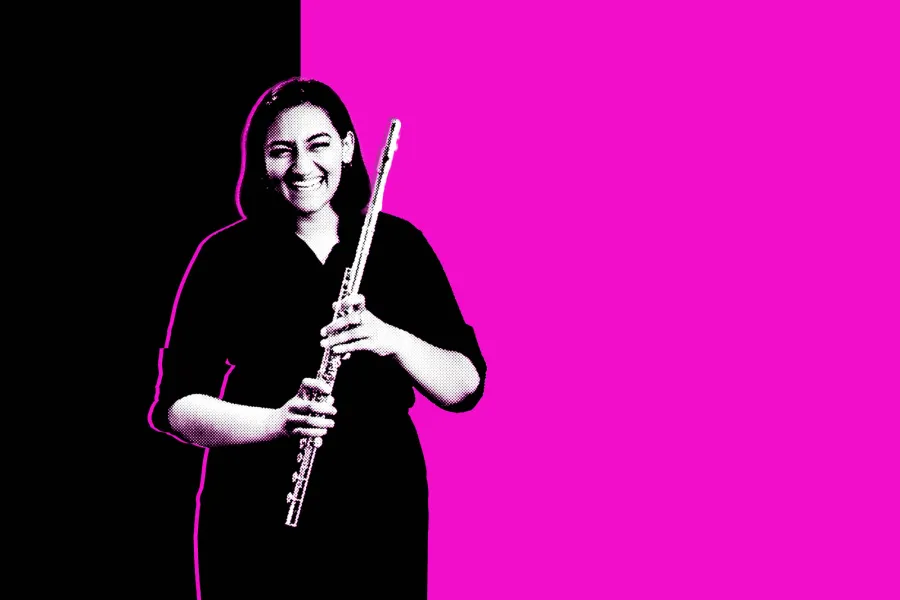
Jerry F. Junkin, conductor
Jimmy Santos-Rivera guest conductor
Tyler Ehrlich, guest conductor
This concert will last about 90 minutes with one intermission.
Please silence your electronic devices.
Photography, video, or recording of any part of this performance is prohibited
Program
Gao Hong
Celebration
José Pujals
Fragmentos de mi Tierra
Jimmy Santos-Rivera, guest conductor
Margaret Bonds
trans. Ehrlich
Spiritual Suite
Valley of the Bones
The Bells
Troubled Water
Tyler Ehrlich, guest conductor
intermission
Percy Grainger
arr. Patterson
Mock Morris
arr. Fennell
Lincolnshire Posy
Lisbon (Sailor’s Song)
Horkstow Grange (The Miser and his Man: A local Tragedy)
Rufford Park Poachers (Poaching Song)
The brisk young Sailor (returned to wed his True Love
Lord Melbourne (War Song)
The Lost Lady Found (Dance Song)
Ron Nelson
Epiphanies
About the Program
Program notes by Mark Bilyeu
Gao Hong
Celebration
Born 1964, Luoyang, Henan, China
Composed 2021
Premiered October 19, 2021, Minnesota Sinfonia, Jay Fishman, conductor, Minneapolis, MN
Duration 8 minutes
Gao Hong, a master of the pear-shaped lute, also known as the pipa, began her career as a professional musician at age twelve. She graduated from China’s premier music school, the Central Conservatory of Music in Beijing, where she studied with the great pipa master Lin Shicheng. She writes “In China, we have many festivals that we celebrate each year. In this piece I use drum solos interspersed with instrumental passages to create joyful rhythms and melodies that depict the festive atmosphere of families gathering together in a festival. The slow middle section expresses the peoples’ yearning for peace, prosperity, and happiness. Celebration was commissioned and premièred by the Minnesota Sinfonia...In 2022, the full orchestra version was performed by the Maryland Symphony Orchestra. It has been my great honor to write this full band version of this piece for “The President’s Own” United States Marine Band and the world premiere performance at the American Bandmasters Association 2024 Conference.”
José Pujals
Fragmentos de mi Tierra
Composed 2006
Duration 9 minutes
“Fragmentos de mi Tierra” is a vibrant and evocative work that captures the essence of Puerto Rico’s rich cultural and musical heritage. Written as a homage to the composer’s homeland, this piece weaves together a tapestry of rhythmic and melodic elements, highlighting the diversity and depth of Puerto Rican musical traditions. José Pujals dedicated much of his work to bringing emblematic traditional melodies to the orchestral stage. This arrangement was designed with a combination of rhythms such as: Bolero, Cha-cha-chá, Guaracha Jíbara, Danza Puertorriqueña and Guaguancó.Through this selection of songs Pujals describes the love that every Puerto Rican feels for their homeland. Some of the melodies are written by composers such as: Rafael Hernandez, Bobby Capó, Antonio Cabán Vale, Clodomiro Rodríguez and Tito Enríquez. Fragments of the well known songs of “Los Carreteros” and “Bello Amanecer” open this piece with a portrait of the great sunrise in the fields of the land. Alluding to the Jíbaro –term used to describe Puerto Rican peasants of the mountain region– that typically is farming while enjoying the landscapes and the great morning breeze. As well as “Verde Luz” and “Preciosa” songs, that carry the narrative of patriotism in lyrics that depict imagery from the island’s beauty. The last part of the piece closes with “Alma Boricua” and “Soñando con Puerto Rico”, portraying the nostalgic feeling of the Puerto Rican diaspora, who had to leave the island without a round ticket, dreaming of their return to their homeland.
Margaret Bonds
Spiritual Suite
Born March 3, 1913, Chicago, IL
Died April 26, 1972, Los Angeles, CA
Composed 1930s - 1940s
Duration 14 minutes
Chicago-born virtuoso pianist and composer Margaret Bonds began her musical studies with her mother, and continued with leading Black musicians of the day like Florence Price and William L. Dawson. At the age of 20, she became the first African-American piano soloist of the Chicago Symphony Orchestra’s history, after winning the Rodman Wanamaker Prize Competition (Florence Price was the other winner that year, for her Symphony No. 1). She described her own music as “jazz and bluesy, and spiritual, and Tchaikovsky all rolled up in one.” She penned Spiritual Suite throughout the 1930s and 1940s as a work for her own needs: a show-stopping closer, and as pianist Michelle Cann describes it: “an inspirational statement of racial and cultural pride.” The three-movement work utilizes three Negro Spirituals made popular by other Black performers of the time, including Marian Anderson and Roland Hayes (“Dry Bones,” “Peter, Go Ring Dem Bells,” and “Wade in the Water”). Despite being one of her calling cards as an artist, it was only the final movement which was published during her lifetime. That is, until Dr. Louise Toppin edited all movements and published them in 2020. Now, thankfully, transcriptions like the one heard on this program exist, to continue sharing the work of one of America’s most significant musical voices.
Percy Grainger
Mock Morris
Born July 8, 1882, Melbourne, Victoria
Died February 20, 1961, White Plains, New York
Composed 1910
Premiered 1912, Queen’s Hall, London
Duration 4 minutes
Unlike much of Percy Grainger’s music, which prominently features folk music of the United Kingdom, as well as songs from the Nordic region, his work Mock Morris was an original tune. "No folk-music tune stuffs at all are used herein..” wrote the composer in the preface to the original 1910 work for string ensemble, “The rhythmic cast of the piece is Morris-like, but neither the build of the tunes nor the general lay-out of the the form keeps to the Morris dance shape." Grainger adapted the work for full orchestra at the request of legendary conductor Leopold Stokowski in 1950, and the American composer and educator Joseph Kreines transcribed the work for band and wind ensemble in 1991. As for the originality of the work, and it’s non-folk tune origins,, Grainger would later go on to say that, perhaps the melody had been “(unwittingly) cribbed from an early Magnificat of Cryil Scott.”
Lincolnshire Posy
Composed 1937 (rev. Fennell 1987)
Premiered March 7, 1937 Milwaukee Symphonic Band, Milwaukee, WI
Duration 17 minutes
“This bunch of "musical wildflowers" (hence the title) is based on folksongs collected in Lincolnshire, England (one notated by Miss Lucy E. Broadwood; the other five noted by me, mainly in the years 1905-1906, and with the help of the phonograph),” wrote Percy Grainger in his original preface to Lincolshire Posy, “... and the work is dedicated to the old folksingers who sang so sweetly to me. Indeed, each number is intended to be a kind of musical portrait of the singer who sang its underlying melody—a musical portrait of the singer's personality no less than of his habits of song—his regular or irregular wonts of rhythm, his preference for gaunt or ornately arabesqued delivery, his contrasts of legato and staccato, his tendency towards breadth or delicacy of tone.” “Lisbon” tell the story of a young sailor bound for Lisbon, while “Horkstow Grange” is subtitled “The Miser and His Man, a local tragedy.” “Rufford Park Poachers” was introduced to Grainger by folksinger Joseph Taylor, who became the first commercially recorded English folk singer after Grainger’s wax cylinder field recordings found a public audience. “The Brisk Young Sailor” is a song about just that, and “Lord Melbourne” was originally titled "Lord Marlborough," referring to John Churchill, 1st Duke of Marlborough. This musical bouquet is topped off by “The Lost Lady Found,” based on the ballad of the same name, which tells the story of a woman thought to have been murdered by her uncle, but who has, instead, run away with a lover. She returns to the town just in time to exonerate her uncle, saving him from the death penalty, resulting in a village-wide celebration, complete with church bells.
Ron Nelson
Epiphanies
Born December 14, 1929
Died December 24, 2023
Composed 1994
Premiered April 8, 1994, University of Illinois
Duration 8 minutes
Ron Nelson undertook his entire musical training at The Eastman School of Music, studying with Louis Mennini, Bernard Rogers, and Howard Hanson. After completing further studies at the Ecole Normale de Musique in Paris, he returned to the United States where he taught composition at Brown University for nearly forty years until his retirement in 1993. His compositional style was eclectic, ranging from aleatory to Renaissance-inspired dances. “Epiphanies is a festive piece of extreme dynamic range,” he explains. “It is a series of fanfare-like proclamations announced by brass, woodwinds and percussion which move from dissonance to consonance. It is intended to celebrate a secular, rather than religious, occasion.” The conductor Leonard Slatkin said that “Nelson is the quintessential American composer. He has the ability to move between conservative and newer styles with ease. The fact that he's a little hard to categorize is what makes him interesting."
About the Artists
Jimmy Santos-Rivera

Jimmy Santos-Rivera (he/him) is currently pursuing a master of music in wind conducting at The University of Texas at Austin, where he serves as a graduate teaching assistant. In this role, he assists in conducting and managing the university’s concert bands, athletic bands, and conducting courses. He earned his bachelor of arts in music education, with a minor in percussion, from the University of Puerto Rico, Río Piedras. Born and raised in Puerto Rico, his career has been deeply rooted on the island. Prior to moving to Austin, Santos-Rivera spent eight years teaching concert band, percussion, and music theory at Escuela Especializada en Bellas Artes Pablo Casals. As a performer, he has played in the percussion section of the Puerto Rico Symphony Orchestra, the Puerto Rico Wind Symphony, and the Puerto Rico Philharmonic Orchestra. In 2019, he joined the 248th Army Band in San Juan, Puerto Rico, where he currently serves as a percussionist in various ensembles and as the principal conductor of the concert band. His mentors include Carlos Ávila, Eddy Marcano, Karlo Flores, and Carmen Acevedo.
Tyler Ehrlich

Tyler Ehrlich (he/him) serves as an assistant instructor and doctoral candidate in wind conducting at The University of Texas at Austin. In this role, he assists with conducting and administrating the university’s concert bands, athletic bands, new music ensemble, and conducting and wind literature courses. Tyler also curates and hosts 89.5 KMFA’s From the Butler School, a weekly program that brings student and faculty performances to the station’s 100,000 weekly listeners. Tyler previously lived in Atlanta, Georgia where he served as conductor of the Emory University Wind Ensemble, director of bands at Decatur High School, and associate conductor of the Atlanta Wind Symphony. He has given invited talks on topics including exoticism, pedagogy, and interpretation at the Midwest Band and Orchestra Clinic, the World Association of Symphonic Bands and Ensembles International Conference, the College Band Directors National Association National Conference, and the Texas and Georgia Music Educators Conferences. Ehrlich has a Master of Music degree from the University of Georgia and a Bachelor of Arts degree summa cum laude from Cornell University. He lives with his partner Brent and their dog Milo. Tyler’s website is tylerehrlich.com.
Jerry Junkin

Serving since 1988 on the faculty of The University of Texas at Austin, where he holds the Vincent R. and Jane D. DiNino Chair for the Director of Bands, in addition to serving as a University Distinguished Teaching Professor, Jerry Junkin is recognized as one of the world’s most highly regarded wind conductors. Previously, he served on the faculties of both the University of Michigan and the University of South Florida. In addition to his responsibilities as professor of music and conductor of the Texas Wind Ensemble, he serves as head of the conducting division and teaches courses in conducting and wind band literature. He has served as music director and conductor of the Hong Kong Wind Philharmonia since 2003, and as artistic director and conductor of the Dallas Winds since 1993. He also serves as visiting professor at the Senzoku Gakuen College of Music Wind Ensemble in Tokyo, Japan. Mr. Junkin has conducted All-State bands and festivals in forty-eight states and five continents, and is a Yamaha master educator.
Wind Ensemble
Flute
Namrata Boggaram
Michelle Cheng
Maggie Chvatal
Molly Damitio
Eunha Kim
Katie Worsham
Oboe
Mary Creel
Lademi Davies
E Shank
Clarinet
Daniel Aisenberg
Jacob Bricker
Connor Gibson
Destiny Lerma
Sadie Murray
Katelyn Nguyen
Nathan Richey
Alexander Vaquerizo
Bassoon
George Alazar
Corey Castillo
Jo Hammerstein
Isabella Perez
Saxophone
Ethan Ashley
David Bennette
Lucy Croasdale
Jacob Feldman
Matthew Meyers
Marina Sakellakis
Horn
Madeline Artman
Owen Clark
Daniela Garcia
Ian Welch
Jenny Wu
Trumpet
Samuel Acosta
Jax Latham
William Paladino
Anthony Ramirez
Leland Rossi
Angelica Salazar
Colby Stone
Trombone
Wyatt Andrews
Carlos Garcia
Jorge Rodriguez
Jared Sierra
Euphonium
Shelby Burton
Miguel Gonzales
Tuba
Mason Clark
Ethyn Evans
Percussion
Justin Cooperman
Matt Garcia
Ethan Hall
Meghan Lawson
Kaiwen Luo
Michael Rivera Gonzalez
Seth Underwood
Clinton Washington
Double Bass
Darrin Luong
Piano
Renan Branco
Organ
Gregory Eaton
Upcoming Events

Wind Ensemble
20th Anniversary Performance of Circus Maximus
by John Corigliano
Join us this winter in Downtown Austin for the 20th Anniversary Performance of John Corigliano's epic third symphony, Circus Maximus. Commissioned by The University of Texas Wind Ensemble and premiered in 2004, Circus Maximus is scored for three different bands: one on stage, an antiphonal ensemble in the hall, and a marching band. The composer used the Circus Maximus arena in Rome as inspiration, with the audience situated in the center, surrounded by sound. Get your tickets now!
Saturday, January 25, 7:30 p.m.
The Long Center for the Performing Arts
Wind Symphony
Friday, November 8, 7:30 p.m.
Bates Recital Hall
Wind Ensemble
Sunday, November 10, 4:00 p.m.
Bates Recital Hall
Symphony Band
Wednesday, November 13, 7:30 p.m.
Bates Rectial Hall
Event Details
$5–15
All University of Texas at Austin students are allowed one free ticket as long as they are available. Student tickets must be picked up at the Box Office with valid student I.D. Seating is unassigned.
If you are a patron with ADA needs, please email tickets@mail.music.utexas.edu and we will reserve ADA seating for you.

